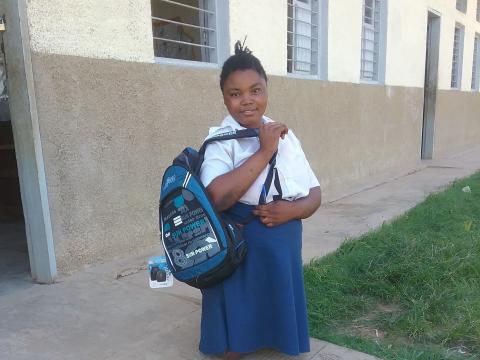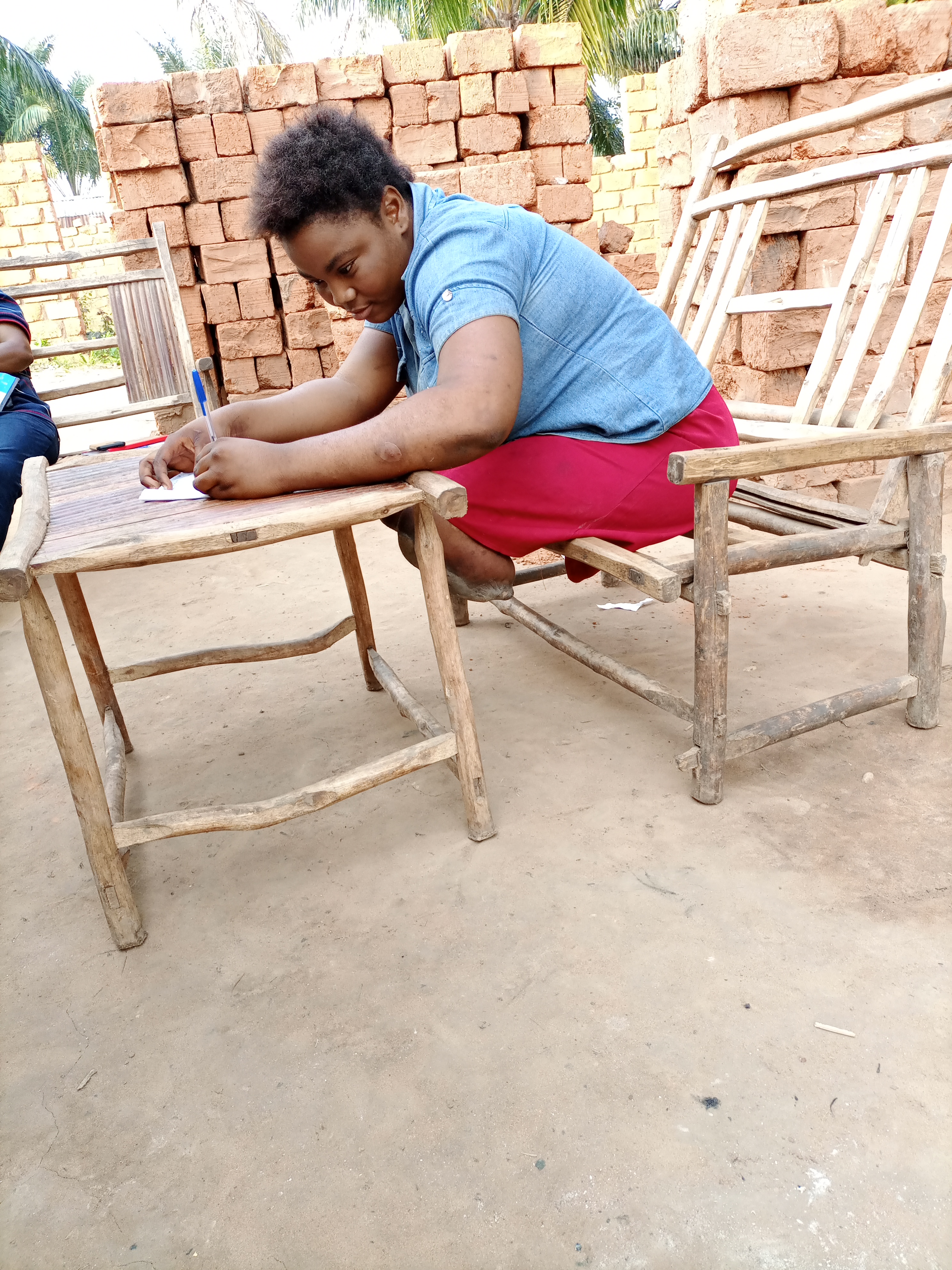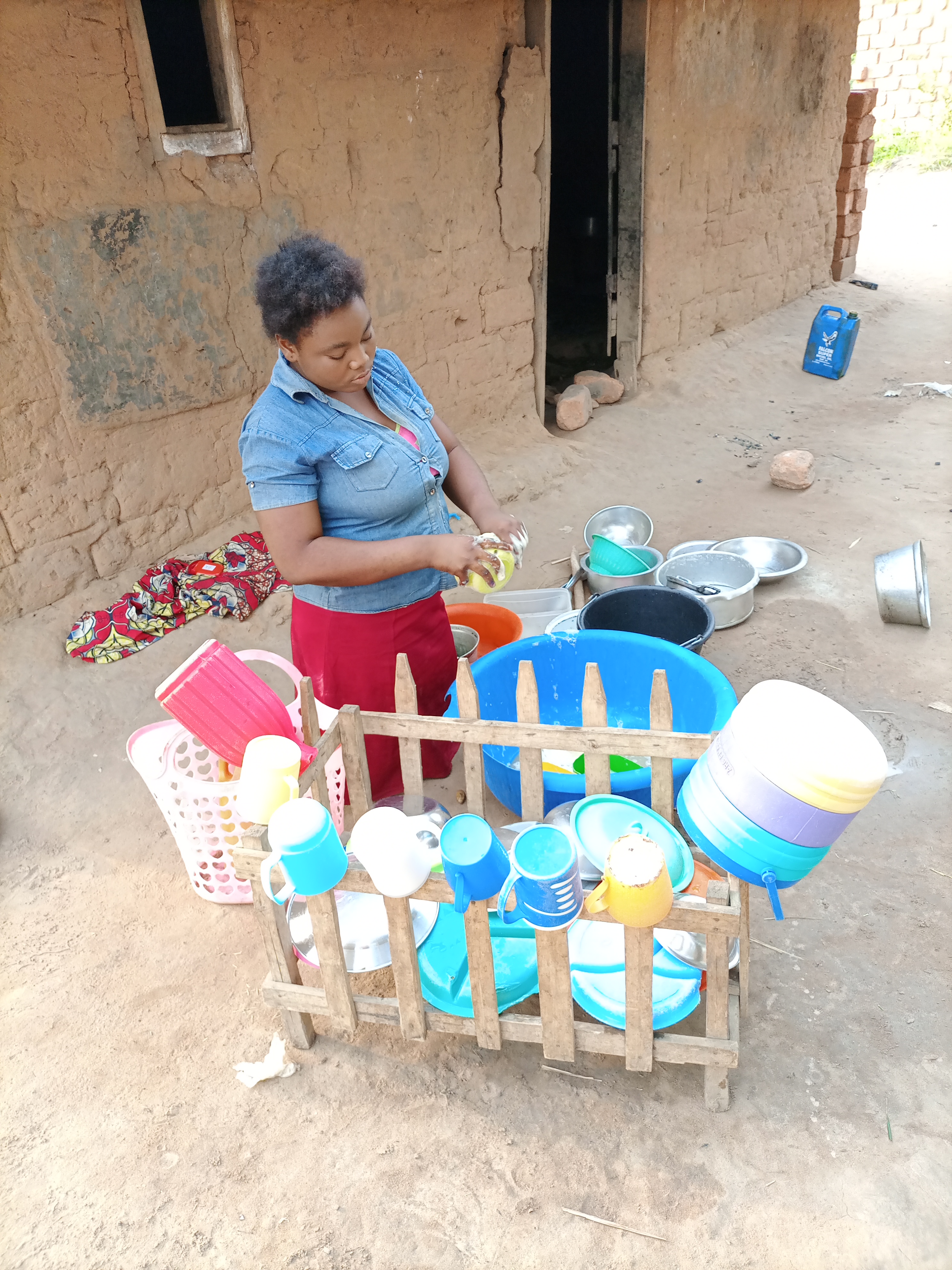School kit keeps Esther's dreams alive despite the challenges of her disability

By Pascal Tshimanga (MEAL Officer) and Carine Maweja (Education Officer, EGAL Project)
-
At the age of two, a train went over her little legs in a tragic accident. She lost both legs in an amputation to save her life, but this could not stop her destiny. Thirteen years later, Esther is wrestling adversity to find her path to a brighter future. The 15-year-old was all smiles and full of determination when she received her first school kit from World Vision.
Esther is the eldest of seven children in a family where four have already died. Her father died in 2012, when she was just six years old. Today, she is a pupil in the 6th year of primary school in Tshimbulu, 120 kilometres from the city of Kananga in DRC's Central Kasai Province.
As one of the children supported through a project to assure Equality for Girls’ Access to Learning (EGAL*), a project funded by Global Affairs Canada (GAC), Esther received her school kit free of charge. In the kit, she found a white and black cloth, nine notebooks, a mathematical box, a medium backpack, pens, pencils, a ruler, and an eraser.
Esther's childhood life, her disability and her studies
"At the age of two, in 2008, my daughter had a train accident. She was trying to cross the railroad, unknown to me, to follow me to the market where I am a saleswoman. This accident cost her both legs, exactly at the level of her knees", her mother says with tears welling in her eyes. Alerted to the accident, the mother rushed baby Esther, who was bleeding profusely and dying, to the local hospital of Saint Joseph. Her medical care was partially supported by the Fathers of Don Bosco who had come to visit Tshimbulu, where her knees were healing after a surgical operation.
As if that wasn't pain enough, Esther was once again thrown off balance when her parents got divorced. "I chose to stay with my mother because I felt she could look after me well, and then in 2012, dad died after a short illness”, Esther narrates.
In 2011, Esther started primary school, again with the financial support of catholic priests of the Don Bosco society. Her mother, however, withdrew the girl from the school. "I decided to withdraw my daughter from school, because the distance she had to move on her stumps every day –more than 3 kilometres. The scorn she suffered from the other children also prevented her from concentrating on her studies and to meaningfully compete with the others”, Esther’s mother explains.
"I would like to become a dressmaker."
In order to promote her daughter's studies, Esther's mother had to conquer many difficulties to enable her to afford the tuition fees, after she decided to send her child back to school in 2015. "My mother decided to get me back to school in spite of my advanced age for Year 6. She supports my studies with the small means coming from her small business of selling palm oil. But this year, I had challenges to have school supplies at the beginning of the school year", Esther explains.

She adds: "I would like to learn the trade of designing and dressmaking in a professional training centre after my primary education, because it is the only profession that I think is favourable to me given my physical condition.”
Consideration for Esther's disability in her community
In her neighbourhood, Esther leads a simple life: "In my community, people always whisper behind my back as I go to school or to the market. Often, I am unable to know whether they are saying bad or good things about me, especially given my disability", she tells us. "At school, my peers look at me with compassion, as do the teachers.”
According to her, at school, her peers are often worried to see a girl with such disability walking to school on her knees. "It hurts them too", she clarifies.
"World Vision has also made me feel good!"
Esther, who had conventional items that were insufficient for a Primary 6 pupil, was provided new school supplies by World Vision as part of the EGAL project. These will allow her to have one notebook per subject class. "I didn't have enough notebooks; I could write two lessons in one notebook, but World Vision gave me a new bag, notebooks, pens, the black and white uniform cup for free", she chimes in. "Now, each lesson can have its own notebook and now I have a second uniform coat!"
She adds: "I thank World Vision very much and I am very happy because the girls who walk on their two feet did not receive this assistance. I. who am disabled, feel valued. May God bless you!”
What Esther does at home after school
"After school, I also play but rarely with the other girls", she tells us. Esther does housework while her mother sells at the market. "I look after my little brothers and sisters, I do the laundry and the dishes after I get out of school. It makes me tired sometimes. This work sometimes prevents me from doing my homework or revising the notes from my lessons".

Esther's request to World Vision
For the future, Esther believes that World Vision can help her with a wheelchair to enable her to move from her home to school often, and also a sewing machine that will enable her to learn cutting and sewing after primary school.
"My mother will not be able to pay the fees for TENAFEP (final primary school examinations). My request is that World Vision can think of me and pay the amount that will be asked of me and others who are disadvantaged", she concludes.
-
*The EGAL project started in 2019 and will end in December 2022. It addresses the social, financial and gender-specific barriers that prevent girls from attending school. The project also contributes to improving the capacity of the education system by strengthening the quality and gender sensitivity of formal and informal education services. To learn more, click here.